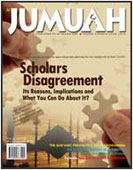The Dignity of Islam's Social Etiquette

Cordially making room for newcomers in a gathering is a rule of refined conduct taught and encouraged by the Prophet Muhammad, sallallahu alayhe wa sallam.
Allah, subhanahu wa ta'ala, says: "O you who have believed, when you are told, 'Make room [for one another]' in gatherings, then make room; Allah will make room for you. And when you are told: 'Arise!' then arise. Allah will raise those who have believed among you and those who were given knowledge by degrees. And Allah is acquainted with what you do" [58:11].
This verse of the Qur'an holds divine instructions and rules of social conduct directed at avoiding discord, spreading care and friendliness among people, and maximizing the benefit of circles of knowledge when we are in them. These rules address assemblies, social gatherings, groups, and study circles. The first rule commands making space for newcomers when sitting in an assembly, allowing them to sit down, feel welcome and part of the assembly. This brings peace and strengthens ties.
The Messenger of Allah, sallallahu alayhe wa sallam, was so beloved by his Companions (Sahabah) that naturally, they sought to sit as close to him as possible, and if that meant they had to compete for a better place close to him, they did. This verse was, therefore, revealed, to address social manners and etiquette. Qatadah, of the great Successor (Tabi'ee) generation that came after the Companions, said commenting on this verse that "it was revealed concerning assemblies of learning and discussion, for when they saw someone approaching, the Companions used to be reluctant to concede a space for him in their assemblies with Allah's Messenger, sallallahu alayhe wa sallam-and thus Allah's instruction to make space for each other."
Several of the sayings of the Prophet, sallallahu alayhe wa sallam, speak to the merits of making space at assemblies. One of these quoted by Ibn Umar says: "Let no person get up only to have another to sit in his place, but rather make room and enlarge your circle" (Bukhari and Muslim). Another version cited by Ahmad, says: "...but rather make space, and Allah will make space for you."
When room is made for someone, it should be accepted, and the person should sit down next to those who made it, and thank them. The Prophet, sallallahu alayhe wa sallam, said: "When people take their places and sit, and a man invites a [Muslim] brother of his and makes room for him, let the latter take it. It is a generous gesture offered to him, so let him sit there" (Tabari).
Making room for newcomers in a gathering is a rule of refined conduct promoted by the Prophet Muhammad, sallallahu alayhe wa sallam, and is characteristic of Islam. It is a sign of affability and mutual affection of all Muslims. It is both a courtesy and a good deed. When someone arrives late to a learning session, the people already there should make room, so that the latecomer may sit down , listen, and benefit from the discussion, rather than have him or her turn back with the excuse that no place is available or that the place is too tight, thus denying one the opportunity of learning. One hadeeth states that while Allah's Messenger, sallallahu alayhe wa sallam, was sitting, three people approached. One of them found an opening in the circle and joined it. Another sat behind other people. The third turned back and left. Allah's Messenger said: "Shall I give you an account of these three? The first took refuge with Allah. As for the second, he felt shy and sat behind the people. The third turned away, so Allah turned away from him."
We should not separate people from each other, for Allah's Messenger, sallallahu alayhe wa sallam, said: "It is not lawful for any man to separate two people without their permission" (Abu Dawud and Tirmithi). Such separation may inconvenience them, for they may have special affection toward each other or may have been discussing a private matter. So separating them, by sitting between them, may disturb them.
The Prophet Muhammad, sallallahu alayhe wa sallam, also said: "No one among you should cause a man to stand and then sit in his place" (Bukhari). A person who sits in a place first is more entitled to it. The best practice is for a person joining a group to sit next to the last person in it. Jabir Ibn Samurah said: "When we joined the Prophet, sallallahu alayhe wa sallam, we used to sit where the end was, "meaning at the end of the group in order not to inconvenience anyone and make them get up" (Abu Dawud).
Another important rule of conduct at assemblies is to take the initiative when entering by greeting the people already there. The Prophet, sallallahu alayhe wa sallam, said: "Do not admit a person who does not begin with a greeting" (AbuYa'la). There are many ahadeeth on the subject of making the salutation of others a common practice. In one of these, the Prophet states: "O People! Spread greetings. Offer food. Keep in touch with your blood relatives. And pray while people are asleep. And you will be admitted into Paradise in peace" (Tirmithi).
When leaving a group, it is proper for a Muslim to commend the people there with salutations of peace, for the Prophet, sallallahu alayhe wa sallam, said: "If one of you joins an assembly, let him greet (the People there). And if he gets up while others are still sitting, let him greet (them). For the former (greeting) is not more of an obligation than the latter" (Ahmed and Abu Dawud).
When Muslims visit one another, they should not stay overly long. Once they have achieved what they came for, they should depart, in order not to inconvenience the host. That is why Allah, subhanahu wa ta'ala, says: "And when you are told, 'Arise,' then arise," which means that when one is asked to get up and leave, one should do so. Abdurrahman ibn Zaid said: "People used to gather at the house of the Prophet, sallallahu alayhe wa sallam, and when they wanted to leave, each desired to be the last to leave him, sallallahu alayhe wa sallam. That made things hard for Allah's Messenger. Therefore, they were ordered to leave."
It is proper for Muslims when sitting with others that they should be both modest and attentive in the way they sit. They should not keep turning their heads in all directions without cause, lest they arouse suspicion and wariness. Nor should they keep clearing their throats for no reason. If someone sneezes and then praises Allah (saying alhamdulillah), the people around should respond with a prayer for Allah's mercy for him. When yawning, the mouth should be covered and further yawning resisted as much as possible. One should not sit with one's back to other people. Moreover, in a group of three, it is not right for two to talk intimately and privately, leaving the third out.
Finally, let the assembly conclude with the supplication mentioned in a hadeeth of the Prophet , sallallahu alayhe wa sallam, narrated by Abu Hurairah which says: "When a person sits in an assembly, having engaged in much idle talk, and then says, before getting up: 'Glory and praise be to you my lord. There is no God other than You. I pray for your pardon and repent to you'-Allah forgives for him what he has done [meaning the idle talk] in that assembly" (Tirmithi).
*****
Article provided by Al Jumuah Magazine, a monthly Muslim lifestyle publication, which addresses the religious concerns of Muslim families across the world.
To subscribe please visit https://www.aljumuah.com/subscription
Topics: Islam Values: Excellence, Manners
Views: 12667
Related Suggestions


















